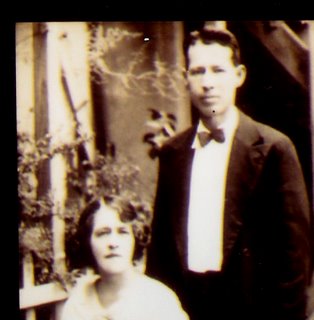Gilbert Cayetano Huesca
(1915 - 2009)
 |
| My father, Gilbert Huesca, as a young man. |
"When I got a little older and we moved back to Tierra Blanca, I started riding a bike. My father wanted all of us to learn how to ride bikes, but again, how could he do that with so many children and so many responsibilities? He was a father first and a businessman second. So, what else? - he decided to rent bicycles.
"When he gave one of us a bike, it would be a brand new bike, and he’d show us how to ride it and become familiar with it. Of course, we’d ride our bikes all around Tierra Blanca. Going around the Alameda, the main park of the town - and it’s a big park - would be my dad, Enrique, Eduardo, Victoria, and I. My father used to push us forward. 'We’re gonna fall,' we’d say. And he’d say, 'Okay. Fall! We’re gonna learn on the bike. You have to get back on the bike.'
"And so we learned to be good bike riders.
"Not too long after I got my bike, I fell off and it broke. I went home to my father, crying because I wanted him to fix it for me. He took the bike from me and instead of fixing it, he took it apart completely, piece by piece. 'I'm not going to repair your bike,' he said. 'You are going to do it yourself.'
"I couldn't believe it. I started crying again, this time very loudly. 'But I don't know anything about bikes! How am I going to fix it if I don't know anything about bikes?'
"My father was a very wise man, and he knew what he was doing. 'Maybe you don't know anything about bikes yet, but this is how you will learn. And I know you can do it.' And he just left me there, staring at my bike.
"I sat there for a long time. I couldn't believe he would leave me like that. At that moment, I thought he was the meanest father in the world. I cried and cried.
"And after a while, I realized he was not coming back to help me, and I began to look at the parts. I picked them up and began turning them over in my hands. And I put my bike back together again, all by myself. I was very proud that I could do it. And when I showed my father, I could see he was very proud of me, too.
"Some time after that, I was out riding my bike and was enjoying the ride so much I did not pay attention to the time. When I realized how late it was, I rode home as fast as I could. I could hear my parents looking for me in the hotel, calling my name. I ran to my room with my bike. I do not know why I still had my bike with me, but I hid under my bed and pulled my bike under the bed, too.
"My father came to my room, calling my name. He sounded very angry. I tried to move farther under the bed, but I guess I pushed my bike out a little bit, and my father saw it. He knew I was there and told me to come out. I knew I was in big trouble. I tried to get out, but I was stuck! My father had to help me get out of there. I think he knew that I had suffered enough when I finally got out, because he never punished me. I learned my lesson and never came home late again.
"My father used to tell us that our parents are right next to God. He did not mean by this that they were equal to God, but that they had a duty that was given them by God to love us and teach us in the same way as He would. They made many sacrifices for us but never called attention to themselves. My father used to say you should never let the right hand know what the left hand is doing. They understood that this was their obligation as parents. Whatever they had, they shared with us and with anyone else who needed help. And they expected us to do the same.
"None of us wanted to disappoint our parents, not because we were afraid of them, but because we viewed them in a sacred way. They never raised a finger to us. All my father would have to do when he disapproved of something we did was look at us in a certain way, and we would know we had done something wrong. It was very powerful.
"The love my mother and father had for us was the best education in life and values we could ever have. How lucky we were. Thank God for them."
Copyright © 2012 Linda Huesca Tully
Did you know, or are you a member of the Huesca or Perrotin families? Did you live in Veracruz in the early to mid-twentieth century? If so, share your memories and comments below.
Did you know, or are you a member of the Huesca or Perrotin families? Did you live in Veracruz in the early to mid-twentieth century? If so, share your memories and comments below.


+Huesca,+Eduardo+Huesca,+Cayetano+Huesca,+and+Enrique+Huesca,+Orizaba+ca+1912-1913.jpg)









